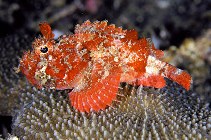| Family: |
Scorpaenidae (Scorpionfishes or rockfishes), subfamily: Scorpaeninae |
| Max. size: |
12 cm TL (male/unsexed) |
| Environment: |
reef-associated; marine; depth range 0 - 18 m |
| Distribution: |
Indo-Pacific: East Africa to the Society Islands, north to Izu Islands, south to Australia; throughout Micronesia (Ref. 1602). Specimens from the Pacific Ocean, currently
regarded as P. mossambica, are most likely to be P. armata (H. Motomura, unpubl. data). The name, P. mossambica., remains valid for specimens from the Indian Ocean (Ref. 86966). |
| Diagnosis: |
Dorsal spines (total): 12-12; Dorsal soft rays (total): 9-9; Anal spines: 3-3; Anal soft rays: 5-5. Supraocular tentacles well developed (Ref. 37816, 48635).
Description: Characterized by having variable color, orangish, pinkish or reddish brown, mottled with white and with dark brown to blackish blotches; adult with posterior lacrimal spine directed anteriorly, ventrally or anteroventrally in juvenile; three spines in suborbital ridge; occipital pit shallow to moderate; depth of body 2.4-2.6 in SL (Ref. 90102). |
| Biology: |
Inhabits areas with mixed sand and rubble in reef flats, shallow lagoons, and channels. Hides during the day, ventures out in the open at night. Anterolateral glandular groove with venom gland (Ref. 57406). Solitary (Ref 90102). |
| IUCN Red List Status: |
Least Concern (LC); Date assessed: 03 March 2015 Ref. (130435)
|
| Threat to humans: |
venomous |
Source and more info: www.fishbase.org. For personal, classroom, and other internal use only. Not for publication.
